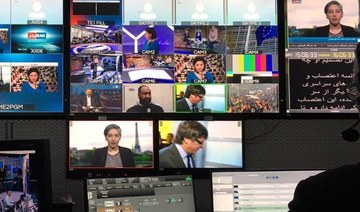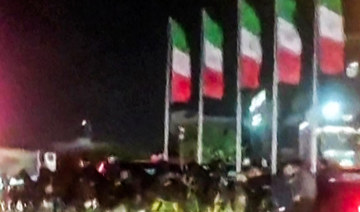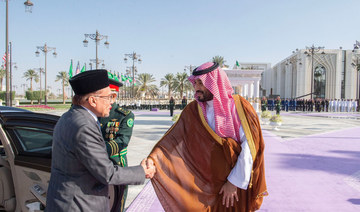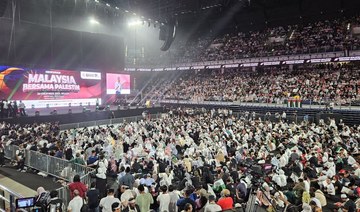TEHRAN: An Iranian Revolutionary Guards general claimed Thursday that the Islamic republic has developed a hypersonic missile capable of penetrating all defense systems, raising concerns from the UN nuclear watchdog.
Hypersonic missiles, like traditional ballistic missiles which can deliver nuclear weapons, can fly more than five times the speed of sound.
“This hypersonic ballistic missile was developed to counter air defense shields,” General Amirali Hajjizadeh, the commander of the Islamic Revolutionary Guard Corps aerospace unit said, quoted by Iran’s Fars news agency.
“It will be able to breach all the systems of anti-missile defense,” said the general, adding that he believed it would take decades before a system capable of intercepting it is developed.
“This missile, which targets enemy anti-missile systems, represents a great generational leap in the field of missiles.”
The head of the International Atomic Energy Agency (IAEA) Rafael Grossi expressed concerns about the announcement.
“We see that all these announcements increase the attention, increase the concerns, increase the public attention to the Iranian nuclear program,” Grossi told AFP on the sidelines of the COP27 climate summit in Sharm el-Sheikh, Egypt.
But he added that he does not see this as “having any influence” on negotiations over the Islamic republic’s nuclear program.
The announcement comes after Iran admitted on Saturday that it had sent drones to Russia, but said it had done so before the Ukraine war.
The Washington Post reported on October 16 that Iran was preparing to ship missiles to Russia, but Tehran rejected the report as “completely false.”
It also comes at a time of protests that have rocked Iran since the September 16 death of Mahsa Amini after her arrest for allegedly flouting the Islamic republic’s dress code for women.
Unlike ballistic missiles, hypersonic missiles fly on a trajectory low in the atmosphere, potentially reaching targets more quickly.
North Korea’s test of a hypersonic missile last year sparked concerns about the race to acquire the technology, which is currently led by Russia, followed by China and the United States.
Both Iran and Russia are targeted by stringent sanctions — Iran after the US unilaterally pulled out of the 2015 nuclear deal, and Russia since it invaded Ukraine in February.
The two countries have responded to the sanctions by boosting cooperation in key areas to help prop up their economies.
Iran on Wednesday hosted Russia’s security chief Nikolai Patrushev for talks on subjects that the Russian side said included “the fight against terrorism and extremism” as well as measures to counter Western interference.
A hypersonic missile is manoeuvrable, making it harder to track and defend against.
While countries like the United States have developed systems designed to defend against cruise and ballistic missiles, the ability to track and take down a hypersonic missile remains a question.
Thursday’s announcement comes against a backdrop of stalled talks on reviving the 2015 nuclear deal.
The deal reached with six major powers — Britain, China, France, Germany, Russia and the US — gave Iran relief from sanctions in return for guarantees it could not develop an atomic weapon.
Iran has always denied wanting a nuclear arsenal.
The deal collapsed after the US’s unilateral withdrawal in 2018 under then president Donald Trump.
Iran’s claim to have developed a hypersonic missile also follows its announcement on November 5 of the successful test flight of a rocket capable of propelling satellites into space.
The United States has repeatedly voiced concern that such launches could boost Iran’s ballistic missile technology, extending to the potential delivery of nuclear warheads.
In March, the US government imposed sanctions on Iran’s missile-related activities.
Iran on Wednesday warned its neighbors including Saudi Arabia that it would retaliate against moves to destabilize it amid the protests sparked by Amini’s death.
“I would like to say to Saudi Arabia that our destiny and that of other countries in the region are linked to each other,” Intelligence Minister Esmail Khatib said.
“Iran has so far adopted strategic patience but it cannot guarantee that it will maintain this strategic patience if hostilities against it continue.
“If the Islamic republic decides to punish these countries, their glass palaces will collapse and they will no longer enjoy stability,” said Khatib.
The minister has also warned Britain it would “pay” for harboring hostile Persian-language media reporting on the Amini protests.
Iran says it has developed hypersonic missile
https://arab.news/bhyy8
Iran says it has developed hypersonic missile

- Hypersonic missiles, like traditional ballistic missiles which can deliver nuclear weapons, can fly more than five times the speed of sound
- The head of IAEA Rafael Grossi expressed concerns about the announcement
UNRWA chief says again barred entry to Gaza by Israel

“Just this week, they have denied — for the second time — my entry to Gaza where I planned to be with our UNRWA colleagues including those on the front lines,” Philippe Lazzarini wrote on X, formerly Twitter.
Lazzarini has been to Gaza four times since the war broke out including on March 17.
“The Israeli authorities continue to deny humanitarian access to the United Nations,” he said on Sunday.
“Only in the past two weeks, we have recorded 10 incidents involving shooting at convoys, arrests of UN staff including bullying, stripping them naked, threats with arms & long delays at checkpoints forcing convoys to move during the dark or abort,” Lazzarini said.
He also called for an “independent investigation” into rocket fire that led to the closure of a key Israel-Gaza aid crossing.
Hamas’s armed wing, Ezzedine Al-Qassam Brigades, claimed responsibility for the Sunday launch, saying militants had targeted Israeli troops in the area of Kerem Shalom crossing.
Houthis claim Red Sea victory against US Navy

- Militia forces lack technical or military capability to achieve their objectives in the Mediterranean, analyst says
AL-MUKALLA: The Houthis have reiterated a warning of strikes against ships bound for or with links to Israel — including those in the Mediterranean — as they claimed victory against the US Navy in the Red Sea.
The Houthi-controlled SABA news agency reported that the fourth phase of the militia’s pro-Palestine campaign would involve targeting all ships en route to Israel that came within range of their drones and missiles, noting that the US, UK, and other Western navies “stood helpless” in the face of their attacks.
“The fourth phase demonstrates the striking strength of the Yemeni armed forces in battling the world’s most potent naval weaponry, the American, British and European fleets, as well as the Zionist (Israel) navy,” SABA said.
Houthi military spokesman Yahya Sarea said on Friday strikes against Israel-linked ships would be expanded to the Mediterranean. Attacks would be escalated to include any companies interacting with Israel if the country carried out its planned attack on the Palestinian Rafah.
Since November, the Houthis have launched hundreds of ballistic missiles and drones at commercial and navy vessels in the Red Sea, Bab Al-Mandab Strait and the Gulf of Aden. They claim attacks are only aimed at ships linked with Israel in a bid to force an end to its siege on the Gaza Strip.
They have also fired at US and UK commercial and navy ships in international waters off Yemen after the two countries launched strikes against Houthi-controlled areas.
On Saturday, Houthi information minister Dhaif Allah Al-Shami claimed the US was forced to withdraw its aircraft carrier and other naval ships from the Red Sea after failing to counteract attacks. He added new offensives would begin against Israeli ships in the Mediterranean in the coming days.
“They failed badly. Yemeni missiles and drones beat the US Navy, and its military, cruisers, destroyers and aircraft carriers started to retreat from our seas,” Al-Shami said in an interview with Lebanon’s Al-Mayadeen TV news channel.
Yemen specialists have disputed Houthi assertions that they have military weapons capable of reaching Israeli ships in the Mediterranean.
Brig. Gen. Mohammed Al-Kumaim, a Yemeni military analyst, told Arab News on Sunday the Houthis would only be able to carry out such attacks if they had advanced weaponry. He said the Houthis were expanding their campaign against ships to avoid growing public resentment in areas under their control after the militia had failed to pay public employees and repair services.
Al-Kumaim added the Houthis might claim responsibility for an attack on a ship in the Mediterranean which was carried out by an Iran-backed group operating in the region.
“Theoretically and technologically, the Houthis lack any technical or military capability to achieve their objectives (in the Mediterranean),” Al-Kumaim said.
Jordanian-Iraqi economic forum begins at Dead Sea resort

- A specialized session will focus on investment prospects in various economic sectors
AMMAN: Jordanian Minister of Investment Kholoud Saqqaf opened the Economic Forum for Financial, Industrial, and Commercial Partnerships between Iraq and Jordan on Sunday.
The forum, which is organized jointly by the Iraqi Business Council in collaboration with the Jordan and Amman chambers of industry, aims to strengthen economic ties between the two countries.
Held at the King Hussein Convention Center on the shores of the Dead Sea, the forum is the largest regional gathering for fostering economic cooperation between Jordan and Iraq, Jordan News Agency reported.
Over two days, the event will promote regional integration by facilitating economic connectivity and encourage collaboration across sectors.
Discussions will cover investment opportunities in Jordan and Iraq, prospects for commercial and industrial ventures, economic modernization initiatives, and opportunities in Jordan’s free and development zones.
Key figures attending include Kamel Dulaimi, the Iraq president’s chief of staff, ministers from Jordan and Iraq, as well as business leaders, investors and representatives from Arab and foreign companies.
Discussions are expected to focus on the banking sector’s role in providing financial support, while highlighting success stories from investment companies in both countries.
A specialized session will focus on investment prospects in various economic sectors, with a particular emphasis on mining and industry.
At the opening, Saqqaf highlighted investment prospects displayed on the Invest in Jordan platform, which align with the kingdom’s Economic Modernization Vision.
Meanwhile, Iraqi Minister of Industry and Mineral Resources Khaled Battal Al-Najm drew attention to his country’s industrial strategy and plans for a joint economic zone with Jordan, alongside efforts to address unemployment and attract foreign investment, especially in mining.
Dulaimi emphasized the significance of Iraqi President Abdul Latif Rashid’s recent visit to Jordan, underscoring discussions aimed at strengthening ties and enhancing economic systems to facilitate investment projects.
UAE delivers 400 tonnes of food aid to Gaza
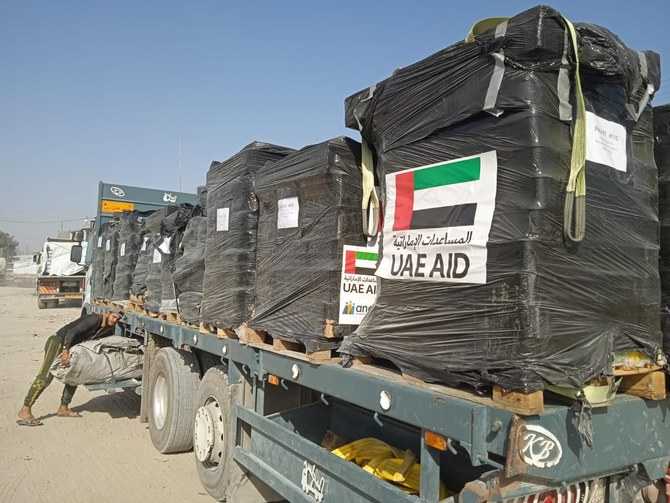
- Delivery, specifically for the northern areas of the enclave, is enough to feed about 120,000 people
DUBAI: The UAE, in partnership with American Near East Refugee Aid, announced on Sunday that it had delivered 400 tonnes of food aid to Gaza.
The delivery, specifically for the northern areas of the enclave, is enough to feed about 120,000 people, Emirates News Agency reported.
Reem Al-Hashimy, Emirati minister of state for international cooperation, said: “The UAE’s safe and successful delivery and distribution of food relief to the Gaza Strip, especially the northern Gaza Strip, marks a significant scaling up in action.”
She continued: “We remain firmly committed to our position of solidarity with the brotherly Palestinian people and alleviating suffering in the Gaza Strip. The UAE, working in parallel with international partners, is determined more than ever to intensify all efforts to ensure that aid lifelines get to those who need it the most.”
Sean Carroll, CEO of ANERA, thanked the Emirati government for its assistance in getting the much-needed aid to the Palestinian people.
“ANERA and the people we serve are extremely grateful for support from the government and people of the UAE, that allows us to deliver this food to northern Gaza, where the needs are so great,” he said.
Last month the UAE allocated $15 million under Cyprus’s Amalthea Fund to bolster aid efforts in Gaza.
Meanwhile, the Gulf country continues to collaborate with international partners and organizations to enable the effective delivery of food and relief via land, air and sea.
To date, the UAE has dispatched more than 31,000 tonnes of humanitarian supplies, including food, relief items and medical supplies, using 256 flights, 46 airdrops, 1,231 trucks, and six ships.
The UAE has embarked on several sustainable relief projects to ensure a consistent supply of food and water to the people of Gaza.
These initiatives include the establishment of five automatic bakeries, the provision of flour to eight existing bakeries, and the installation of six desalination plants with a combined capacity of 1.2 million gallons of water a day.
Malaysian PM condemns West’s ‘sheer hypocrisy’ over Gaza war

- Anwar Ibrahim spoke on a wide range of topics in interview during recent visit to Riyadh
- He pointed out Malaysia had “issued statements to demand that the Gaza genocide must end”
DUBAI: Malaysia takes a strong stance on the war in Gaza and condemns the “sheer hypocrisy” of Western countries over the ongoing Israeli killing of Palestinian women and children, Prime Minister Anwar Ibrahim has said.
Speaking to Katie Jensen, host of the Arab News current affairs program “Frankly Speaking,” during a visit to Riyadh for a special meeting of the World Economic Forum last week, he said that a failure to prevent genocide in Gaza could foster extremism.
“We have issued statements to suggest that their genocide must end,” Anwar said in an interview that can be read in full on page 3.
“And it’s sheer hypocrisy for countries, some countries in the West, including the United States, to deny these continued killings of children and women and civilians.
“Whatever your political position is, I don’t believe that in this period we can condone these sort of inhuman, barbaric acts against fellow human beings. And I think that position is clear. Our position is very strong in that direction.
“I know for an emerging, developing country, it may sound a bit too harsh, but then how do you condone continued killings of women and children? There’s no other way except to at least express in the very strongest terms possible.
“I appreciate the role of the Arab neighbors and Turkiye and Iran and all these other countries trying to do their part. And I think we in Malaysia and many other countries outside the region, too, are expressing gross concern because people are feeling enraged.
“And we don’t want this to prolong, because it will only lead to groups to foster fanatical extremist or terrorist action in the absence of the failure of the international community.”
According to recent reports, the prosecutor of the International Criminal Court may soon issue warrants for the arrest of Israeli Prime Minister Benjamin Netanyahu and Defense Minister Yoav Gallant on charges of deliberately starving Palestinians in Gaza.
If the ICC rules that genocide is taking place in Gaza, Anwar said he would support calls for the arrest of the Israeli ministers.
“I don’t believe that any reasonable person could dispute the incontrovertible effects adduced to support their allegation that genocide has been committed,” he said. “Once it is established that genocide happened, then of course the warrants have to be issued.”

In Kuala Lumpur, a trial is currently taking place after an Israeli national was arrested on March 28 suspected of entering Malaysia to assassinate a compatriot. He was found in possession of six guns and some 200 rounds of ammunition.
The case has raised speculation as to whether the man, named by local authorities as Shalom Avitan, was in fact a spy.
Asked whether any proof had been found connecting the Israeli national to espionage or organized crime, Anwar said investigations were ongoing.
“They have not established the fact that whether this criminal is a spy, but certainly the actions, the movements, the amount of weapons and the link networking within the country is of course concerning,” he said.
“And the authorities are taking tough measures to make sure they get to the bottom of it.”
On whether an independent Palestinian state is likely to come to fruition this year from the ashes of the Gaza war, Anwar said no country — including the US — has the right to deny the resounding global support for Palestinian statehood.
“There are 139 countries that have given recognition to the state of Palestine,” he said. “Now, why must one or two countries consider them above all these considerations and refuse to accept this?
“And to my mind, it is dishonorable to deny the right, not only of Palestinians but of the international community when they decide after years or decades of deliberations, looking at the facts, looking at historical decisions, looking at the precarious position now on the issue of security of the region, issue of economic progress.
“After all these considerations, 139 say, yes, we must recognize the existence of the state of Palestine. I don’t believe any country has the right to deny the sentiments, aspirations of the world.”



